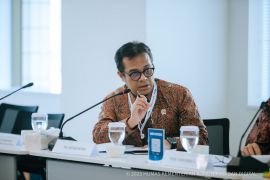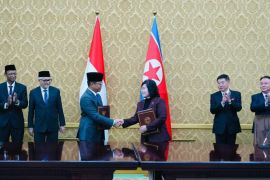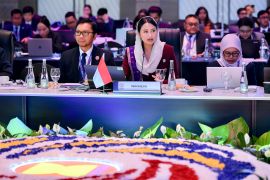Sailors and ship crews who came across sea borders in Southeastp Asia, for example in the southern Philippines Sulu Sea and in the Malaysian waters of Sabah, often become victims of piracy and were taken hostage by armed groups.
This issue has been a concern of ASEAN countries, including Indonesia, because there were several incidents of sea hijackings, with Indonesian sailors taken hostage during 2016, especially in the triangle of Indonesia-Malaysia-Philippines.
For instance, in June 2016, seven Indonesian ship crews were taken hostage by the armed Abu Sayyaf group in the southern Philippines Sulu Sea.
In July 2016 a similar incident happened again. The Abu Sayyaf members kidnapped three Indonesian citizens in the waters of Felda Sahabat, Lahat Datu in Malaysia. Throughout 2016, there were at least seven hijackings and kidnappings of Indonesian sailors, and the perpetrator were the same - the Abu Sayyaf group.
This has been an ongoing security dilemma for ASEAN countries.
These actions can be categorized as acts of terrorism. In fact, the Abu Sayyaf group has been declared a terrorist group by the Philippine government.
Terrorism is a delicate issue. Unlike normal security dilemmas, in which conflicts are state-to-state or between states, terrorism is an asymmetric security threat stemming from a relationship between strategy and tactics conducted outside accepted international norms by non-state actors, in this case, terrorist groups.
Moreover, maritime piracy by the Abu Sayyaf group also can be categorized as a transnational crime.
By definition, transnational crimes are those that occur across national borders. Transnational crimes also include crimes that take place in one country, but their consequences significantly affect another country.
Even if the crime is committed by a terrorist group from the Philippines, it might affect other countries and nations. Beside Indonesians, Malaysian and Vietnamese ship crews also have became victims of hijackings and kidnapping by the armed group based in the southern Philippines waters.
Considering the nature of maritime piracy - by armed group operating in international waters � which is a terrorist act, as well as a transnational crime, no country should or can face this problem alone.
The Indonesian government, through the Ministry of Foreign Affairs, has approached countries that have a direct interest in this issue, namely Malaysia and the Philippines. Malaysia needs to protect Malaysian ship crews who have been taken hostage by the Abu Sayyaf group.
To the Philippines, Indonesia emphasized the fact that frequent hijacking by Abu Sayyaf have occurred in southern Philippines' waters, particularly along the trade lanes, through which ships deliver coal needed by Philippines' energy suppliers.
Indonesia has been trying to deal with the problem, along with Malaysia and the Philippines.
Indonesia, Malaysia and the Philippines have agreed to begin joint army training later in 2017 to advance efforts to secure the Sulu Sea from rampant piracy. The military training will take place in Indonesia's Tarakan in North Kalimantan, Malaysia's Tawao Island and the Philippines' Bongao Island.
Earlier, Indonesian Defense Minister Ryamizard Ryacudu explained that the training locations would later become posts for a joint taskforce to help secure Sulu waters. The three countries also have agreed to start joint sea patrols.
However, to solve this problem of maritime piracy through the regional ASEAN organisation, Indonesia also needs to approach other ASEAN countries, not only Malaysia and the Philippines, since coordination and planning are crucial for the success of undertakings that are too large or complex for any country to address. Complex issues, such as maritime piracy in Southeast Asia, is the kind of challenge that requires regional cooperation.
The efforts could begin with the Indonesian government propose a regional meeting discussing border security between countries in Southeast Asia region. For the long-term goal, Indonesia could initiate a type of ASEAN Joint Patrol for Sea Border Security, as a regional mechanism aimed at solving maritime piracy matters in Southeast Asia.
Nevertheless, Indonesia, through diplomatic efforts, needs to attract the attention of all parties by demonstrating that the meeting being proposed is for the common interest of all ASEAN countries.
Border issues are a delicate matter, because they are associated with sovereignty, so Indonesia's approach should be more focused on what the ASEAN countries could gain, as opposed to what they are losing.
Encouragement can also be given to all ASEAN countries to agree upon the joint patrols, as the objective to create security and stability in the territorial waters of Southeast Asia - particularly in trade lanes � is in the common economic interest of surrounding nations.
The Indonesian government can also emphasize that ASEAN joint patrols might also be useful to address other boundary issues in the region, such as fishing and the trafficking of people through the sea.
Another measure which might be discussed is the effort to establish intelligence cooperation among ASEAN countries and gather information that could be used to weaken the network of armed groups.
For instance, ASEAN intelligence services could share information about funding of the Abu Sayyaf group. Such armed groups often have financiers, to assure they continue to operate.(*)
Reporter: Yuni Arisandy
Editor: Heru Purwanto
Copyright © ANTARA 2016








